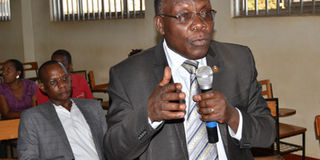Varsity dons want government commitment on popularising Swahili

Ndejje University Vice Chancellor Prof Eriabu Lugujjo. PHOTO BY DAN WANDERA
What you need to know:
- The 1992 government White Paper on education policy review commission report titled ‘Education For National Integration and Development’ recommended that both Kiswahili and English be compulsory subjects throughout the primary cycle in both rural and urban areas.
- In 2003, government ordered the ministry of Education to introduce compulsory Kiswahili teaching in all lower and higher school levels in the country in order to promote it ahead of the East African integration.
KAMPALA. A section of dons from leading Ugandan universities have blamed the slow adoption of Swahili language on lack of political will, coupled with poor attitude and perception among Ugandans.
According to Prof. Abas Kiyimba, a professor of Literature at Makerere University Kampala, government policy makers and implementers have backtracked on many would be good policies including the popularisation of Swahili, whose progress he said is still very slow despite making it a compulsory subject in secondary schools.
“Government has been slow in catching up with its own policies passed. The first attempt to roll out Swahili as an official language was in 1973 when it was decreed as a national language by then President Idi Amin through a national vote. In 1995, Swahili language was for the second time enacted as second official language and we would have expected policy implementers to have made a significant progress which is not the case. We need a political will to have this language spoken by more than 100 million people across the African continent made visible. Perhaps the absence of a national language policy could be another contributory factor,” Prof Kiyimba said.
He was delivering a paper “The role of Kiswahili in the integration of East African Community” at a public lecture held at Ndejje University, Kampala Campus on Monday .
Kiswahili is already an official language in Tanzania and Kenya where it is spoken by majority of the population. In Rwanda and Burundi, it is widely spoken but some Ugandans claim the language was used by harsh colonial officials and government law enforcement agencies and criminals, hence their dislike for it.
Prof. Kiyimba advised government to avoid using terminologies such as official language, national language that could possibly offend some people who still nurse a bad past history for people who could have taken advantage of ‘this good language(Swahili)’ for their selfish ends.
“Let Swahili language be taught like any other language with no coated verbal medals,” Prof. Kiyimba said .
Prof. Eriabu Lugujjo ,the vice chancellor Ndejje University called for a speedy and well- thought-out- programme targeting all institutions of learning to make teaching of swahili easier through availing small pamphlets for easy reading.
“We should also have people who can develop small modules for Swahili literature for readers. We have a variety of other avenues through which the Kiswahili language can easily be taught. Let us develop teaching cells like the way bible studies are held to ensure that even people who are not in school get the opportunity to learn the language,” Prof Lugujjo advised.
Earlier, Prof. Fred Wanjala Siminyu from the department of Kiswahili and other African languages at Kibabii University, Kenya in his presentation, said Swahili presents the opportunity of re-igniting and driving the process of integration of East Africans.
When contacted State Minister for Higher Education, Mr John Chrysostom Muyingo admitted that they encountered some challenges in popularising Swahili language in the country.
“Honestly speaking, there have been some challenges, but there is an ongoing review of the curriculum and we are going to ensure that Kiswahili is compulsory at lower secondary level,” he said
He said government had also signed a Memorandum of Understanding with Tanzania to get good Swahili teachers.
“Even in the next budget, we plan to put more money in promoting the teaching of Kiswahili so that we consolidate it as a common language of the East African Community,” the minister added
The 1992 government White Paper on education policy review commission report titled ‘Education For National Integration and Development’ recommended that both Kiswahili and English be compulsory subjects throughout the primary cycle in both rural and urban areas.
“Emphasis in terms of allocation of time and in the provision of instructional materials, facilities and teachers will, however, be gradually placed on Kiswahili as the language possessing greater capacity for uniting Ugandans and for assisting rapid social development,” the report said.
In 2003, government ordered the ministry of Education to introduce compulsory Kiswahili teaching in all lower and higher school levels in the country in order to promote it ahead of the East African integration.




